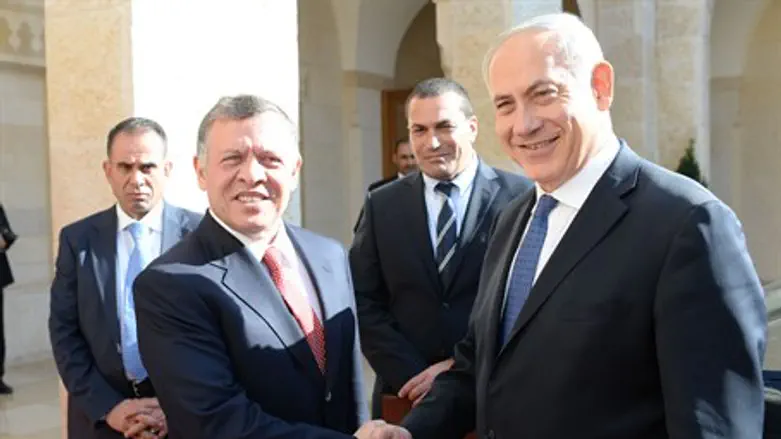
Prime Minister Benjamin Netanyahu spoke Thursday by telephone with Jordanian King Abdullah II, the premier's office said, apparently their first contact since Jordan announced its ambassador was returning to Tel Aviv, reports AFP.
"Prime Minister Netanyahu extended his condolences to the King and to the Jordanian people" over the murder of a Jordanian air force pilot who was burned to death by Islamic State (ISIS) terrorists, a statement said.
Netanyahu "noted the importance of the Jordanian ambassador's return to Israel and of the joint commitment to maintaining the status quo at the holy sites" in Jerusalem, it added.
On Monday, Amman announced that its envoy would return to his post in Tel Aviv three months after being recalled over "violations" at the Temple Mount - namely growing talk of allowing equal Jewish prayer rights at the holiest site in Judaism.
Jordan recalled Walid Obdeidat on November 5 after Arab rioters attacked police with rocks and other projectiles at the Al-Aqsa Mosque on the Mount, and police responded by locking them in the mosque. At the time Jordanian Foreign Minister Nasser Judeh described Israel's enforcement of law and order on the site as "violations" and "way beyond the limits."
Jordan said the decision to return Obeidat to Israel comes after the government "felt that the situation (at Al-Aqsa) is in the right direction."
After Arab nations pressured Israel, Netanyahu declared his desire to preserve the discriminatory "status quo" of no Jewish prayer at the site, which is under the de facto rule of the Jordanian Waqf (Islamic trust).
Obeidat's recall had put enormous pressure on already frosty ties between Israel and the only Arab country apart from Egypt to have signed a peace treaty with the Jewish state - a treaty Jordan recently threatened to revoke, even as it has been leading the Palestinian Authority's (PA) "diplomatic war" against Israel at the UN.
Around half of Jordan's population of seven million defines itself as "Palestinian," with many urging that a "Palestine" be established there, particularly given that the state was created by fiat by the British after World War II.
